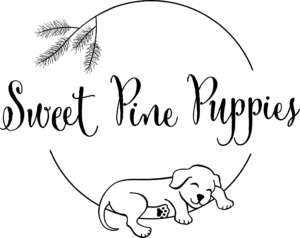Daytime Potty Training
Potty training starts the second you receive your new puppy. The first step is to choose a place where you want them to go potty. If you have a designated play area with gates, it might be a washable piddle pad in the corner. If you live in an apartment, you might have a grass pad on a balcony. If you have a yard, it might be one corner of the yard. Regardless of where you prefer them to eliminate, these steps will help.
When you first get home with your puppy, bring them to the designated potty spot that you want them to use. You can play with them to keep them in that area until they go potty. You can give them water/food if needed. It’s very important to get their scent in the area that you want them to go potty, so they know that that’s where they are supposed to go.
As they are finishing going potty (without distracting them from eliminating) say “go potty!” and give them a treat and praise.
Repeat “go potty” every time they use the potty in the correct spot.
Puppies at the age of 8-9 weeks should be going potty about every 30 – 45 min when they have access to water or food. Over the first few weeks they are home, this could stretch up to an hour or so. You can look at the time when they go and see how frequently they are going, and then you will have a little prediction on when they will need to go again.
They will also probably need to go potty when they wake up from a nap, during vigorous play, when exiting the kennel or sleeping/bed area, after meals, and generally any time they change activities. It’s much better to bring them to the potty spot too frequently than not frequently enough. When in doubt, take them out!
As they get older, it should lengthen to a ratio of 30 min per month old. So if they are 4 months old, they should be able to go potty every 2 hours. By the time they are 6 months old, they should be ok for about 3 hours between potty breaks.
If you are with the puppy, you will notice a “tell” when they need to go potty. Usually it is walking in a circle or smelling around them. When you notice this, bring them to the potty area and wait for them to go potty. As they are finishing going potty (without distracting them from eliminating) say “go potty!” and give them a treat and praise.
Training Note: Once they learn the “go potty” phrase, it can be used to tell them that it’s time to go potty. For example, if you are on a road trip and need them to go potty because you won’t be stopping again for a while; or right before bedtime when you need them to go potty before locking up the house for the night.
Night Time Potty Training
Depending on your bedtime schedule, remove food and water 2 hours before your bedtime to allow the puppy a greater chance of holding it all night.
If you take your puppy out in the middle of the night, do not make it a play session. Be matter of fact (not a lot of talking) and get down to business. Once they learn the command “go potty” you can use that to tell them it’s time to go, but this is usually not needed. Don’t praise them or give them a treat, just bring them right back into the kennel. These puppies are very bright and if they know that you will get up in the middle of the night to play with them, talk sweet and love on them, or give them treats, they will start waking you up for attention alone. We strongly suggest kennel training, and potty training is one of the biggest reasons why.
Accidents
Trouble with your puppy having accidents in the house? When your puppy has an accident, it is best to clean it up thoroughly and move on. Rubbing their nose in it doesn’t help, they will just be confused about why you are asking them to smell their elimination. Scolding or other negative actions also do not help, they won’t understand what it’s related to. One thing that you can do is note the time and try to let them go more frequently for a few days and then start stretching it out again.
If you catch your puppy in the middle of going potty, you can try to quickly bring them to the potty area. If you are successful and they end up going potty there (even if it’s just a little bit) tell them happily “go potty!” and give them praise or a treat, as if they did the whole thing there.
Positive reinforcement will greatly speed up potty training.
